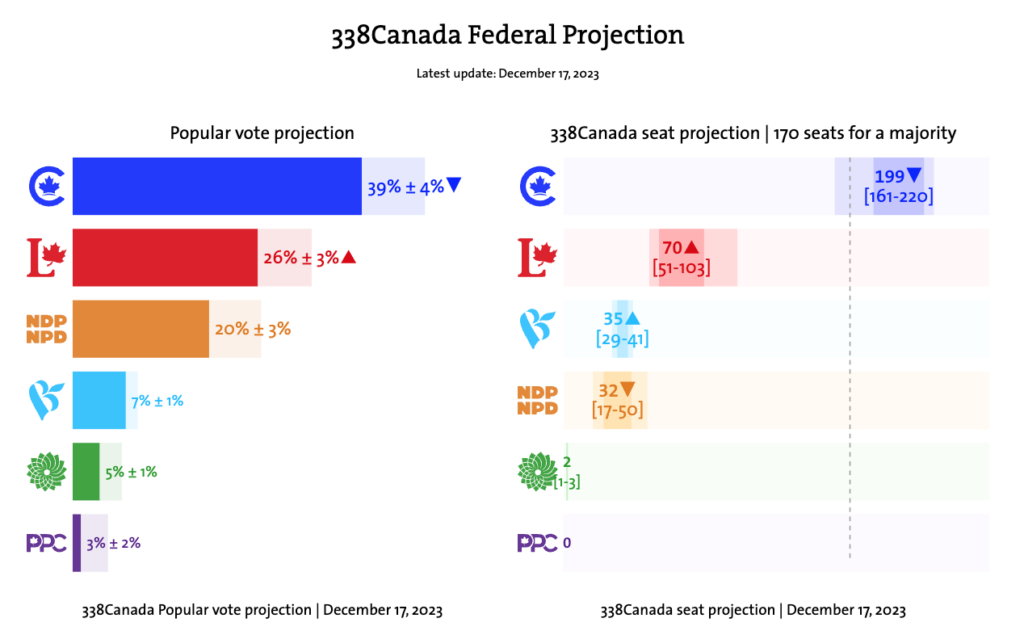The fall sitting of the House of Commons came to a close with a controversial final two weeks.
The Conservatives blocked progress on government legislation for several days through hundreds of amendments to the annual government estimates that forced an all-night voting session with the goal of removing the federal carbon tax. House of Commons Speaker Greg Fergus was investigated over his impartiality and lack of judgement after he sent a taped message to his friend and former interim leader of the Ontario Liberal Party. In the end, the Liberals used the procedural tools available to them to hold off the Conservatives and the NDP came to the rescue of the speaker, who apologized to the House and promised to regain MPs’ trust. Neither of these fits of partisanship advanced the governing of the country by one step.
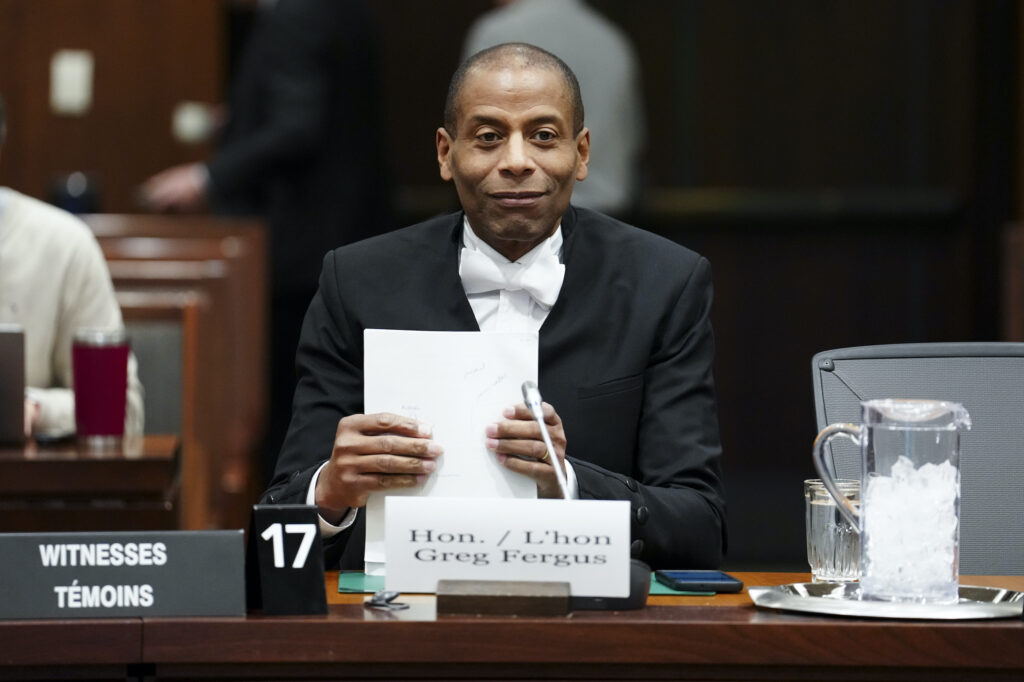
Once addressed, the House of Commons rose for its holiday break on Friday, December 15, and MPs will return on Monday, January 29, 2024. The Senate will resume no later than Monday, February 6, 2024.
In advance of the break, there was a flurry of policy activity as the government released new initiatives addressing stricter methane regulations, the framework for the oil and gas emissions cap and the implementation details of the new federal dental insurance program.
The fall sitting was a challenging three months for the Liberals. When the House resumed in September, it was apparent that the cost of living and housing supply and affordability issues would dominate the fall policy and political agenda. While the government moved quickly to roll out an ambitious housing program, the houses and rental accommodations announced will take a year or two to become available, perilously close to the end of the government’s current electoral mandate.
Inflation has proven to be a stubborn opponent and Canadians are feeling the pain of high prices. A new study estimates that, “from February 2020 to the summer of 2023, the total impact of consumer price increases was akin to a nearly $100 billion drop in aggregate household disposable income.” Overall inflation has cooled significantly during 2023, down from its high of 8.1 per cent in June 2022, coming in at 3.1 per cent in October. The Bank of Canada has paused its interest rate hikes, but food prices are still at an all-time high, and results from the government’s attempts to encourage the grocery chains to restrain price increases have been negligible.
At several points this fall, unexpected events blew the government off course. The prime minister’s disclosure that there was credible evidence that agents of India played a role in the murder of a Canadian Sikh nationalist, and former Speaker Anthony Rota’s invitation of a World War II veteran who fought with the Nazis to Ukrainian President Zelenskyy’s speech to the House, left the government struggling to regain control of its agenda. It also cost Speaker Rota his job. The late November U.S. indictment of an Indian government agent for directing the attempted assassination of an American citizen in the United States corroborated Prime Minister Trudeau’s earlier disclosure.
This fall, the government’s climate policies were increasingly under attack on several fronts. Ottawa lost two major court cases over the constitutionality of the Impact Assessment Act and the banning of single use plastics. After the government lifted the carbon tax on home heating oil, several premiers demanded the removal of the tax on all home heating fuels. In addition, an Indigenous group, the Chiefs of Ontario announced it is taking the government to court over its entire carbon pricing regime, arguing that it is “discriminatory and anti-reconciliatory” in its application. More court challenges are likely coming, over the clean electricity regulations and the oil and gas emissions cap, as western premiers, Danielle Smith and Scott Moe, continue to fight Ottawa’s climate initiatives.
Over the past three months, the Conservatives have continued to build their lead over the Liberals. As of December 3, the Conservatives were at 40 per cent in public support, the Liberals at 25 per cent, the NDP at 20 per cent, the Bloc Quebecois at 7 per cent, the Greens at 5 per cent and the Peoples Party of Canada at 3 per cent.
The national economy
Economic activity began to slow in mid-2023 as businesses and households adjusted to higher borrowing costs. The economy effectively stalled in the third quarter of the year, with real gross domestic product declining 1.1 per cent on an annualized basis. Inflation has continued to trend down, but in October still rose 3.1 per cent year over year.
On December 6, the Bank of Canada kept its benchmark interest rate steady at five per cent, commenting that “The slowdown in the economy is reducing inflationary pressures in a broadening range of goods and services prices.” But the bank noted that shelter costs are the last remaining source of continuing inflation, and that a premature interest-rate cut would only make that worse by lowering mortgage rates.
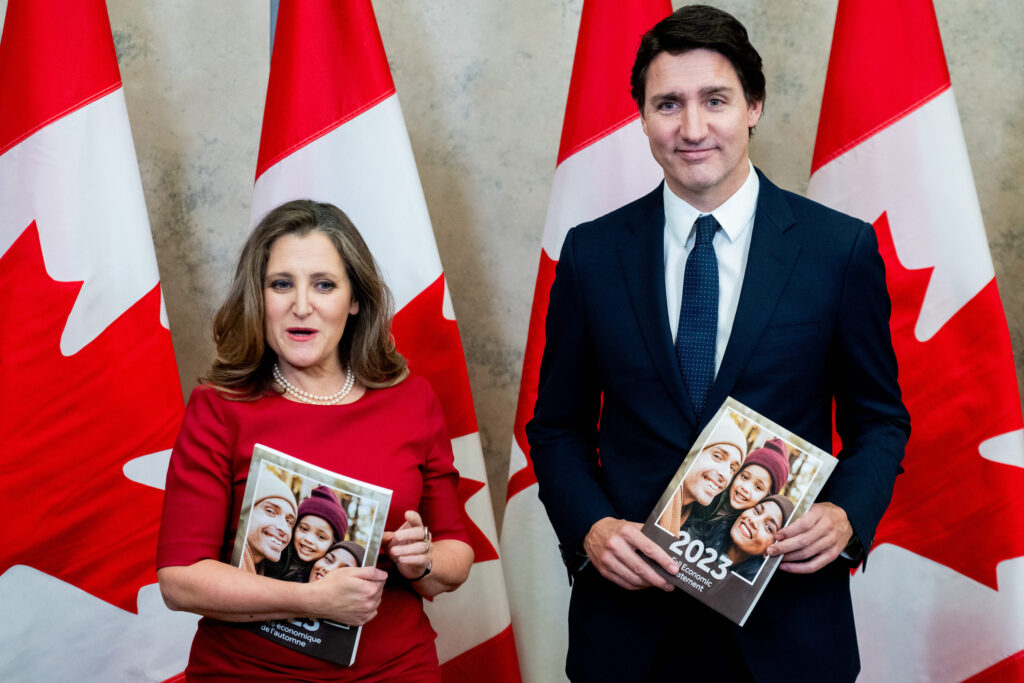
Deputy Prime Minister and Finance Minister Chrystia Freeland tabled her Fall economic Statement on November 21 with a distinctly subdued economic outlook for 2024:
- Economic growth is forecast to be 2.2 per cent for this year and 0.4 per cent next year.
- Inflation remains persistent and is forecast to remain at or above 3 per cent until the first quarter of 2024, then fall below that level in the second quarter of 2024.
- The deficit will be $40 billion for this year, with debt carrying charges now at $46.5 billion for the current year and forecast to reach $60.7 billion per year in 2028-29.
- Federal spending is forecast to be up by $20.8 billion over the next six years.
The minister’s statement earned plaudits from Bank of Canada governor Tiff Macklem, who said, “The government is not adding new or additional inflationary pressures over the next couple of years, which is the critical period over which we will be looking to reduce inflation and get it back to the target.”
Finance Canada has opened the consultation process for Budget 2024. Submissions will be accepted until February 9, 2024.
The conflict in Gaza
Following the October 7 Hamas attacks on Israel, all leaders of Western liberal democracies have struggled with domestic audiences to find balance between the supporters of Israel and the Palestinians. The more Prime Minister Trudeau tries to find balance in his comments on the war, the more criticism he attracts. His November call for Israel to exercise “maximum restraint” in Gaza resulted in a public scolding from Israeli Prime Minister Netanyahu, and loud heckling from pro-Palestinian protesters at several public events. Finding balance is a continuing challenge for the prime minister, because the fault line on support for the two sides runs right through the centre of the Liberal Party.
On December 12, in advance of the United Nations debate on the Israel-Hamas war, Canada, Australia and New Zealand released a joint statement calling for the earlier humanitarian pause to be resumed and pledging to “support urgent international efforts towards a sustainable ceasefire.” Palestinian groups applauded the government’s support for the UN motion, while two Liberal backbenchers disagreed and the Centre for Israel and Jewish Affairs (CIJA) said in a statement that it was both “shocked and “disgusted” by Canada’s vote, saying that the country was turning its back on the Jewish community and Israel’s right to defend itself.
The government agenda
Federal housing initiatives
Throughout the fall, the government has made eight announcements of agreements with municipalities and a master agreement with the province of Quebec under the $4 billion Housing Accelerator Fund to assist municipalities fast track additional housing units over the next three years.
The government is removing the goods and services tax (GST) on the construction of new rental apartment buildings and called on provinces to match the federal rebate. Ontario, British Columbia, and several other provinces have removed the full provincial portion of the GST on new rental housing developments.
Deputy Prime Minister and Finance Minister Chrystia Freeland recently announced an additional $20 billion in Canada Mortgage Bonds to ease financing of apartment buildings, student housing and seniors’ residences – a move that was strongly welcomed by builders.
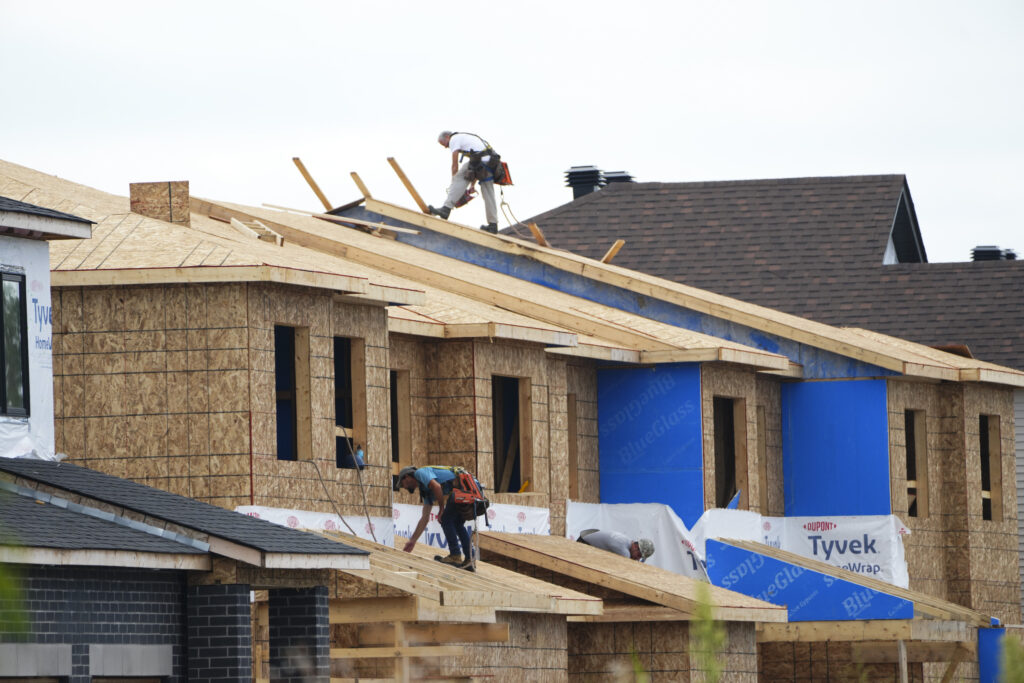
Challenges to climate change initiatives
During the fall, the courts ruled against two key elements of the federal climate plan:
- On October 13, the Supreme Court found the federal Impact Assessment Act (IAA), also known as Bill C-69, to be on balance unconstitutional, because it was outside federal jurisdiction.
- In a November 16 ruling, the Federal Court found that the federal listing of single use plastics including plastic straws as “toxic” was “unreasonable and unconstitutional” because the federal government had acted outside its authority. The government is appealing this ruling to the Supreme Court.
In late October, the federal government removed its carbon tax from heating oil for three years, providing funding to homeowners to switch to heat pumps instead of heating with high-carbon emitting fuel oil. The government will provide significant subsidies to make the change free for those under median income and GST-free for others. Premiers of other provinces not as reliant on fuel oil as the Atlantic provinces demanded similar breaks be extended to natural gas used for home heating. Saskatchewan introduced the Carbon Tax Fairness Act, legislation to stop SaskEnergy from collecting the carbon tax on January 1, 2024.
The federal draft clean electricity regulations have continued to attract provincial criticism over the last three months. On November 27, Alberta Premier Danielle Smith used Alberta’s Sovereignty Act to introduce a resolution in the legislature declaring Ottawa’s proposed clean electricity regulations an unconstitutional federal measure and spelling out ways the regulations would not be enforced in the province.
Amendments to the federal methane regulations
On December 4, the federal government released stricter draft regulations to restrict the release of methane by the oil and gas industry. They are designed to help Canada reach and exceed its 2030 target of slashing methane emissions from the oil and gas sector by at least 75 per cent below 2012 levels. Starting on December 16, 2023, Environment and Climate Change Canada will accept feedback on the draft regulations until February 14, 2024. The final regulations are expected to be published in late 2024.
While industry spokespersons said the new federal targets are “achievable,” several Alberta ministers called the new regulations “unconstitutional” and “unrealistic.” Premier Danielle Smith vowed that “our government will use every tool at our disposal to ensure these absurd regulations are never implemented in our province.”
Oil and gas emissions cap
On December 7, the federal government released its plan to implement its long-promised oil and gas emissions cap. The framework proposes to cap 2030 emissions at 35 to 38 per cent below 2019 levels to reach the government’s goal of reducing emissions in the sector to net zero by 2050. The oil and gas sector is responsible for 28 per cent of Canada’s emissions.
The limits are not as low as the original 2030 target of reducing emissions in the sector by 42 per cent below 2019 levels. One source told CBC News that the government set lower targets to avoid legal and constitutional fights with provinces.
Alberta Premier Danielle Smith issued a statement last week calling the framework an “intentional attack by the federal government on the economy of Alberta and the financial well-being of millions of Albertans and Canadians.” Smith said Alberta owns its resources and, under the Constitution, has exclusive jurisdiction to develop and manage them. Saskatchewan Premier Scott Moe said the emissions reductions contained in the framework will burden the oil and gas sector “with more red tape and regulations.”
The Supreme Court of Canada has ruled that Ottawa can regulate greenhouse gas emissions but natural resources, and therefore oil and gas production, is solely provincial jurisdiction. That means any policy that would force production cuts opens the federal government to another court challenge by the provinces. Alberta insists the emissions cap would in fact inevitably mean a cut in production.
Details of dental insurance plan revealed
On December 11, health minister Mark Holland announced the implementation details of the new dental care insurance plan that will begin covering routine dental costs for low and middle-income people next year. The plan is administered by Sun Life and is being phased in over several years, starting with children under 18 and seniors over 80.
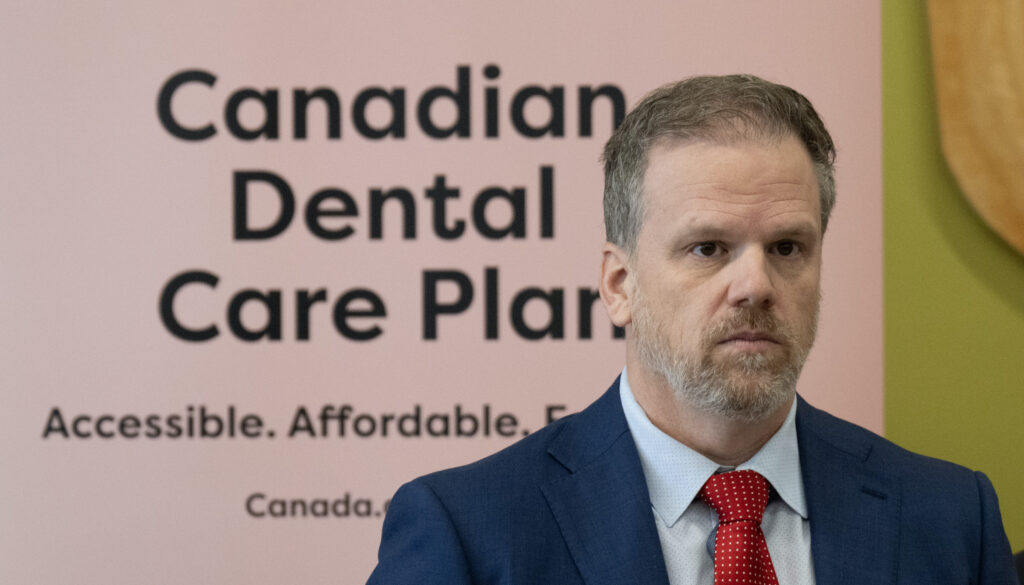
To be eligible for the program, a person must have a household income below $90,000 and no access to an existing private insurance plan. The person must also have filed a tax return so the government can verify income. For families with incomes below $70,000, there will no co-pay requirements; for families with incomes above that level, co-pays will rise until the program phases out at the $90,000 level. Benefits will start to flow in the first quarter of 2024.
Ongoing issues
Online News Act (Bill C-18): Meta continues to reject the legislation, which requires it to pay for Canadian media content and has blocked Canadian news from its social platforms. On November 29, Google and the federal government agreed that Google will make annual payments of $100 million to media and be able to negotiate with a single media group. On December 15, the federal government released the regulations for the Act, which defines the portions of the Google payments that will go to broadcast and print media.
Digital Services Tax (DST): The OECD earlier decided to put off multinational implementation of the DST for at least another year. Minister Freeland recently tabled tax measures following the FES that would see the DST being implemented retroactively to January 1, 2024, but removed its automatic enactment on that date, leaving it to the discretion of cabinet to implement. U.S. Ambassador David Cohen and U.S. Trade Representative Catherine Tai again warned that the U.S. would regard the move as a violation of Canada’s legal trade obligations. In response the PM said Canada is simply not prepared to wait for the OECD’s global deal.
Alberta’s pension gambit: In November, Alberta Premier Danielle Smith announced that the province is exploring leaving the Canada Pension Plan and establishing an Alberta Pension Plan. She tabled a report by Lifeworks that suggested that Alberta would be due 53 per cent of the CPP’s assets on leaving the CPP, which has been soundly rejected by other provinces. At a recent finance ministers meeting, Finance Minister Freeland promised the Chief Actuary of Canada will provide a calculation of what Alberta will be able to expect to receive if it decides to leave the CPP. In mid-December, Alberta announced it is pausing its public feedback hearings on leaving the CPP pending receipt of the Chief Actuary’s report.
Legislation
The fall sitting has been relatively unproductive for the new government house leader, Karina Gould. Only three bills made it to third reading in the House, the Supply bill, Bill C-34: National Security Review of Investments Modernization Act, and Bill C-56: An Act to amend the Excise Tax Act and the Competition Act. These bills are now with the Senate.
Three bills were successful in clearing both houses: C-48: An Act to amend the Criminal Code (bail reform), which gained Royal Assent on December 8 and Bill C-21: An Act to amend certain Acts and to make certain consequential amendments (firearms), and Bill C-56, which received Royal Assent on December 15.
The following bills remained before the House of Commons at the close of the fall sitting:
- Bill C-26: An Act respecting cyber security, amending the Telecommunications Act and making consequential amendments to other Acts (At consideration in committee in the House)
- Bill C-27: Digital Charter Implementation Act, 2022 (At consideration in committee in the House)
- Bill C-33: Strengthening the Port System and Railway Safety in Canada Act (At second reading in the House)
- Bill C-50: Canadian Sustainable Jobs Act (At second reading in the House)
- Bill C-57: Canada-Ukraine Free Trade Implementation Act, 2023 (At consideration in committee)
- Bill C-58: An Act to amend the Canada Labour Code and the Canada Industrial Relations Board Regulations, 2012 Replacement Workers (At second reading in the House)
- Bill C-59: An Act to implement certain provisions of the fall economic statement tabled in Parliament on November 21, 2023, and certain provisions of the budget tabled in Parliament on March 28, 2023
Liberal-NDP Confidence and Supply Agreement
Due to the Liberals’ weakness in the polls, the NDP pressed them throughout the fall sitting to complete their commitments under the agreement:
- The Canadian Sustainable Jobs Act (Bill C-50 is currently before the House at second reading.
- Bill C-58, the “anti-scab” legislation prohibiting the use of replacement workers in the federally regulated sector was introduced and is at second reading.
- The implementation details for the new $13 billion dental insurance program were released by the government on December 11.
The final and potentially largest piece of the agreement is pharmacare. The agreement called for the government to pass pharmacare legislation by the end of 2023. The NDP is holding out for a universal and comprehensive national plan that is publicly administered and negotiations are continuing. On December 14, the two parties agreed to a new March 1 deadline for introduction of the pharmacare bill in the House of Commons.
Looking ahead
Medical Assistance in Dying
On February 2, 2023, the federal government introduced legislation (former Bill C-39) to extend the temporary exclusion of eligibility for medical assistance in dying (MAID) where a person’s sole medical condition is a mental illness by one year. On March 9, 2023, the extension of the temporary exclusion of eligibility for medical assistance in dying received Royal Assent and came into force, postponing the eligibility date for persons suffering solely from mental illness until March 17, 2024.
The Special Joint Committee on Medical Assistance in Dying was appointed to undertake a review the provisions of the Criminal Code relating to medical assistance in dying and their application, including mature minors, advance requests, mental illness, and the state of palliative care.
In a Canadian Press interview published on December 15, Justice Minister Arif Virani raised the possibility of another pause, after the government considers the report of the Special Joint Committee, as well as advice from medical experts and other stakeholders.
The political scene
According to the 338Canada website, which averages all recent national polls, the Conservatives now have a 13-percentage point lead over the Liberals. As of December 17, the Conservatives were at 39 per cent, the Liberals at 26 per cent, the NDP at 20 per cent, the Bloc Quebecois at 7 per cent, the Greens at 5 per cent and the People’s Party of Canada at 3 per cent.
